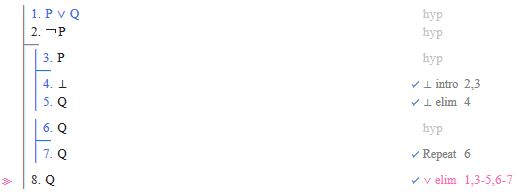Source: 1. p 287, 5. p 261. Sweet Reason: A Field Guide to Modern Logic (2010 2 ed) by Henle, Garfield, Tymoczko.
[1.] Predicate is the reason we started on deductions. In Sentential, remember, we can verify that an argument is valid by using truth tables or the short-cut method. With Predicate, we have no such tool. We can show that an argument is invalid if we exhibit a universe in which the premises are true and the conclusion is false, but (until now) we have had no means of showing that an argument in Predicate is valid.
- [Write a deduction to prove the Disjunctive Syllogism, hereafter DS.]
Per 1, I already know how DS can be proven more quickly with (Indirect/Short-Cut) Truth Tables; so a deduction (which would take longer) is needless. But in general, for Valid Arguments, are Deductions fallible? For Sentential Logic, are (Indirect/Short-Cut) Truth Tables the only 100% safe method?
Consider the following. Because 4 is the the Principle of Explosion, anything can be deduced in 5: so what if you instead wrote (wrongly) ¬Q (instead of the correct Q)? Then the Deduction would continue and conclude with ¬Q, but dangerously and deceptively, would fail to reveal this error?
[ Source : ]

